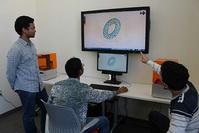P&G funds 3D printing education for local students
"Revolutionizing Healthcare with 3D Printing” will enable West Lafayette Junior/Senior High School students to visit Grissom Hall’s 3D Printing Lab and learn about the impact of different manufacturing processes in healthcare.
"This education program uses 3D printing to promote creativity, innovation, and teamwork among K-8, K-12, undergrad, and graduate students by giving them the chance to interact with rapid design and prototyping," said Martinez.
The K-8 and K-12 projects will have two phases. An initial orientation phase will teach students how to use free apps developed at Purdue to operate 3D printers and to generate 3D printable files.
"These apps use 'touch-and-go' technology to enable the creation of 3D models by drag-and-drop geometric shapes on a template model, developing abstract reasoning," he explained.
Next comes a transfer phase, in which the students will apply their new skills in the Grissom 3D Printing Lab. Then they will test their models by, for example, listening to each other's heartbeats with 3D printed stethoscopes and using 3D printed dental floss picks and P&G floss to clean their teeth.
"These project-based learning experiences will help kids to solve problems through critical thinking and rapid prototyping in an early stage of their development, engaging them in STEM education," stated Martinez.
In addition to working with these junior high and high school students, Martinez also teaches undergraduate and graduate courses in Manufacturing, Novel Polymers, and Robotics. The P&G grant will help him expand these offerings by including:
- Introduction to 3D Printing will focus on operating a 3D printer, generating 3D printable content, exploring practical (business) applications of 3D printing, and learning about the latest advances in 3D printing techniques.
- A Lab Section will give hands-on experience with 3D models developed during the previous lessons.
- And a Final Team Project will explore the "Thingiverse Assistive Technology Challenge" to create prototypes designed to meet the needs of people with disabilities.
Martinez hopes this program will benefit a wide range of students. "This education program aims to help students become creative, imaginative, rigorous, and successful problem-solvers by giving them the chance to use new technologies and to create new low-cost tools to improve living conditions of low-income families," he said.
Writer: DeEtte Starr, starrd@purdue.edu

